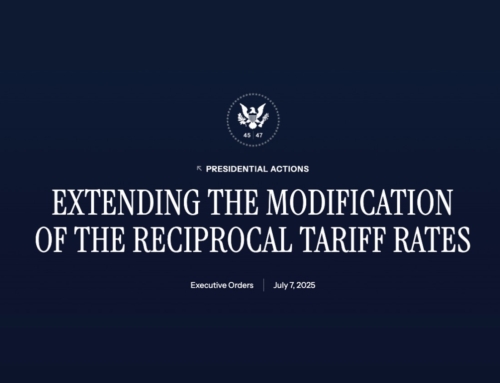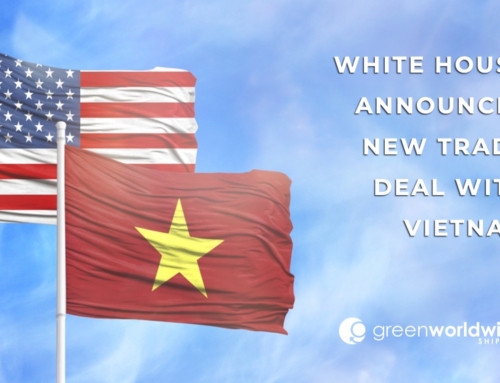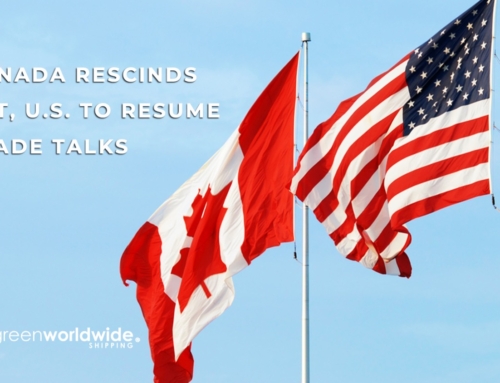U.S. SUPPLY CHAIN IMPACTS FROM THE 2025 BUDGET RECONCILIATION PACKAGE
On July 4, 2025, H.R. 1, known as the One Big Beautiful Bill Act, was signed into law by the White House. As a budget reconciliation package, the legislation modifies federal tax policy, raises the country’s debt ceiling, and sets budgets for federal agencies. The Act includes notable changes that are relevant to the U.S. supply chain, including adjustments to de minimis import rules, increased funding for Customs enforcement, program repeals affecting freight sustainability efforts, and updates to agricultural import quotas.
DE MINIMIS ENFORCEMENT REFORM: NEW PENALTIES & 2027 RESTRICTIONS
The Act’s most immediate impact on the U.S. supply chain stems from management adjustments to de minimis import regulations under Section 321 of the Tariff Act of 1930. Phase one begins on August 3, 2025, when civil penalties of up to $5,000 for a first violation and $10,000 for each subsequent violation will apply to any party that enters, facilitates, or attempts to introduce merchandise using the de minimis entry process in violation of other U.S. Customs laws.
The most significant change takes effect on July 1, 2027, when the commercial shipment exception is repealed. This notable change removes a provision that previously allowed high-frequency importers and consolidators to access de minimis clearance beyond standard thresholds. Once repealed, de minimis eligibility will be limited to what is permitted under 19 U.S.C. § 1321(a)(2), with no exceptions based on shipment volume or method of shipment.
U.S. Customs and Border Protection (CBP) processed more than $1.36 billion de minimis shipments that entered the United States in FY 2024, up from $771 million in FY 2021, with a total declared value exceeding $54 billion.
These new regulations are expected to affect importers, brokers, platforms, and third parties that process or facilitate low-value shipments, including e-commerce and clothing retailers.
Importers of low-value shipments should begin reviewing their current supply network to:
- Confirm that all de minimis entries meet eligibility, valuation, and origin documentation standards under Section 321.
- Review how third-party platforms, fulfillment providers, or consolidators declare entries on your behalf.
- Identify which product lines or customers may no longer qualify for de minimis treatment after the commercial shipment exception is repealed on July 1, 2027.
- Coordinate with Customs brokers to transition ineligible shipments to formal entry (e.g., Entry Type 01 or 86); and
- Evaluate shipping consolidation programs as a tool to reduce the number of transactions, improve classification control, and optimize formal entry procedures, especially for high-frequency imports currently routed informally.
CBP, EPA, AND USDA CHANGES THAT AFFECT FREIGHT MOVEMENT
In addition to the new enforcement provisions to de minimis, the One Big Beautiful Bill Act implements agency-specific adjustments that may influence how freight moves through U.S. ports, how logistics operators access sustainability funding, and how agricultural import quotas are managed.
- Customs and Border Protection (CBP): CBP received a budget increase under Section 80004 of the Act, with FY 2025 appropriations totaling $20.5 billion. This funding supports expanded operations, including Customs enforcement, port staffing, and potential upgrades to targeting and risk management systems that govern both formal and informal entries.
- Environmental Protection Agency (EPA): Grant programs previously supporting the EPA’s low-emission logistics and port electrification projects were repealed under Sections 70101 through 70103 of the act. These grants included funding for the Greenhouse Gas Reduction Fund, Clean Heavy-Duty Vehicles Program, and Environmental and Climate Justice Block Grants. Repeal of these programs could limit access to federal funding for SmartWay partnerships, electric drayage initiatives, and zero-emission infrastructure at ports and intermodal terminals.
- U.S. Department of Agriculture (USDA): The USDA will now administer revised sugar tariff-rate quota (TRQ) procedures under Section 70504. The law directs USDA and USTR to reallocate unused TRQ volumes more quickly and authorizes the review of import licensing rules for refined sugar. U.S. sugar refiners, beet and sugarcane growers, and food manufacturers that depend on imported sugar may gain improved supply predictability under the new quota reallocation structure.
READ THE COMPLETE ACT TEXT HERE: H.R.1 – ONE BIG BEAUTIFUL BILL ACT
Stay up-to-date on freight news with Green’s Weekly Freight Market Update by following us on LinkedIn. For continuous updates, make sure to check out our website at greenworldwide.com.






